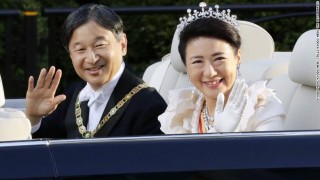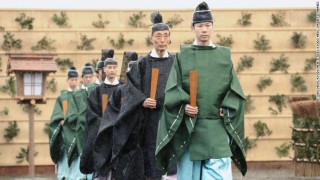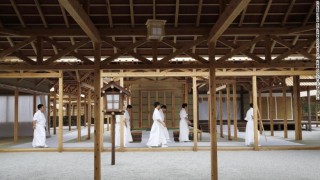Loading
Search
▼ Japan's Emperor Has A $248 Million Dinner Date With A Sun Goddess
- Category:Other
(CNN)Japan's new Emperor Naruhito will take part in a ritual feast with a sun goddess on Thursday night as part of a centuries-old ceremony to celebrate his ascension to the throne.
But not everyone is on board with the ritual, which has been criticized for violating the constitutional separation of religion and state.
Since he formally ascended to the Chrysanthemum Throne at the start of May, Naruhito has been undertaking a series of ceremonies and rites. On Thursday night, he will take part in a mystical, 2.7 billion-yen ($248 million) ritual known as "Daijosai" -- or "rite of great feasting" -- which will see him sharing a banquet with the Shinto deity Amaterasu, the sun goddess traditionally claimed by the Japanese Imperial family as one of its divine ancestors.
Preparations for the ritual began months ago, when the shell of a tortoise was baked until it fractured. The cracks in the shell were then subject to an act of divination to determine the rice to be used in the Daijosai should be planted, according to Japanologist John Breen, who has written about the ceremony. In this case, the rice was planted in fields in Kyoto and Tochigi prefectures. The ceremony will see Naruhito offering the newly-harvested rice to the sun goddess in two purpose-built wooden halls within the Imperial Palace grounds. The halls -- which cost millions of dollars to construct -- will be burned down after the ceremony, Breen said.
"The Daijosai transforms the Emperor from just an ordinary human to a sovereign whose authority extends over both this realm and the other realm," Breen said. "The Daijosai happens just once in a reign -- it's a major event. Because it involves the Emperor with the sun goddess in the most intimate fashion, it transforms him."
Around 700 people -- including Prime Minister Shinzo Abe -- have been invited to attend the ceremony, although they will not go inside the halls with the Emperor.
Last month, Naruhito officially proclaimed his enthronement in a ritual-bound, centuries-old ritual attended by dignitaries from around the world. Last weekend, Naruhito and his wife, Empress Masako, were cheered by thousands during an imperial parade in the capital Tokyo. The celebrations had been delayed by Typhoon Hagibis, which left nearly 90 people dead.
Japan claims it is the world's oldest continuous monarchy, with over 2,000 years of tradition.
The Emperor will spend around six hours with the sun goddess in two different halls. There are different theories about what happens during the ceremony, which is only attended by the Emperor, two "maidens," and the sun goddess, Breen said.
In the 1920s, the belief accepted by the state was that the Emperor had conjugal relations with the sun goddess, according to Breen. Both halls are furnished with a bed covered with a silk sheet -- and the theory was that the Emperor lay on the bed, covered himself with a sheet, and waited for the sun goddess to come down from heaven and enter his body.
But that idea has fallen out of favor. In 1990 -- when the former Emperor underwent the rite -- the Imperial Household dismissed the theory, saying that the Emperor doesn't lie on either bed. Instead, the beds are there to "welcome the weary sun goddess who comes down from heaven," Breen said.
"Nonetheless, there is a vital communion between the Emperor and the sun goddess, and this is at the heart of this Daijosai," he said.
The ceremony dates back to around the 7th century, when it was created to reinforce the idea that the Emperor received his right to rule from the sun goddess. "If the Emperor claims descent from the sun goddess, then the stability of his reign is that much more secure," Breen said. Until the 20th century, Japanese rulers were considered the living embodiment of gods. Naruhito's grandfather, Emperor Hirohito, was the last divine Emperor.
After World War II, the United States occupied Japan. The country introduced a new constitution that banned the Imperial family from engaging in politics and Emperor Hirohito renounced his divine status.
Nowadays, Naruhito is a symbol of the state rather than the head of state, and the Japanese Emperor wields no political power.
The Imperial Household says the tradition is integral to an enthronement -- but critics say it compromises Japan's separation of religion and state.
Under Japan's constitution, the state must refrain from religious activity and cannot fund religious institutions. Critics say Daijosai is an example of the state funding a religious rite -- and harks back to an era when the Emperor was considered the human embodiment of a god.
When Naruhito's father Emperor Akihito underwent the rite in 1990, a number of citizens groups launched legal suits against the government's involvement in Daijosai. Those cases were ultimately dismissed.
Last year, more than 300 plaintiffs, including Christian priest Takuya Hoshide, filed a lawsuit against the government for funding the enthronement rituals with public money.
"If we allow (state funding of the Daijosai) to happen, we are helping to create the society that suffocates our ability to say no to the imperial myth," he said. "We must create a society where we can have any religious belief."
Naruhito's younger brother Prince Akishino last year questioned the level of public money spent on the ceremony, which he called highly religious.
Although Naruhito's father broke with tradition in a number of ways -- including becoming the first monarch to marry a commoner, and the first in two centuries to abdicate the throne -- Breen believes the tradition of Daijosai is likely to continue, especially as opposition has dwindled.
"It is part of the modern tradition of emperor making and it appears to be the wish of emperors to carry it out. I expect it will be carried out into the distant future," he said.
But not everyone is on board with the ritual, which has been criticized for violating the constitutional separation of religion and state.
Since he formally ascended to the Chrysanthemum Throne at the start of May, Naruhito has been undertaking a series of ceremonies and rites. On Thursday night, he will take part in a mystical, 2.7 billion-yen ($248 million) ritual known as "Daijosai" -- or "rite of great feasting" -- which will see him sharing a banquet with the Shinto deity Amaterasu, the sun goddess traditionally claimed by the Japanese Imperial family as one of its divine ancestors.
Preparations for the ritual began months ago, when the shell of a tortoise was baked until it fractured. The cracks in the shell were then subject to an act of divination to determine the rice to be used in the Daijosai should be planted, according to Japanologist John Breen, who has written about the ceremony. In this case, the rice was planted in fields in Kyoto and Tochigi prefectures. The ceremony will see Naruhito offering the newly-harvested rice to the sun goddess in two purpose-built wooden halls within the Imperial Palace grounds. The halls -- which cost millions of dollars to construct -- will be burned down after the ceremony, Breen said.
"The Daijosai transforms the Emperor from just an ordinary human to a sovereign whose authority extends over both this realm and the other realm," Breen said. "The Daijosai happens just once in a reign -- it's a major event. Because it involves the Emperor with the sun goddess in the most intimate fashion, it transforms him."
Around 700 people -- including Prime Minister Shinzo Abe -- have been invited to attend the ceremony, although they will not go inside the halls with the Emperor.
Last month, Naruhito officially proclaimed his enthronement in a ritual-bound, centuries-old ritual attended by dignitaries from around the world. Last weekend, Naruhito and his wife, Empress Masako, were cheered by thousands during an imperial parade in the capital Tokyo. The celebrations had been delayed by Typhoon Hagibis, which left nearly 90 people dead.
Japan claims it is the world's oldest continuous monarchy, with over 2,000 years of tradition.
What happens during the ceremony?
The Emperor will spend around six hours with the sun goddess in two different halls. There are different theories about what happens during the ceremony, which is only attended by the Emperor, two "maidens," and the sun goddess, Breen said.
In the 1920s, the belief accepted by the state was that the Emperor had conjugal relations with the sun goddess, according to Breen. Both halls are furnished with a bed covered with a silk sheet -- and the theory was that the Emperor lay on the bed, covered himself with a sheet, and waited for the sun goddess to come down from heaven and enter his body.
But that idea has fallen out of favor. In 1990 -- when the former Emperor underwent the rite -- the Imperial Household dismissed the theory, saying that the Emperor doesn't lie on either bed. Instead, the beds are there to "welcome the weary sun goddess who comes down from heaven," Breen said.
"Nonetheless, there is a vital communion between the Emperor and the sun goddess, and this is at the heart of this Daijosai," he said.
The ceremony dates back to around the 7th century, when it was created to reinforce the idea that the Emperor received his right to rule from the sun goddess. "If the Emperor claims descent from the sun goddess, then the stability of his reign is that much more secure," Breen said. Until the 20th century, Japanese rulers were considered the living embodiment of gods. Naruhito's grandfather, Emperor Hirohito, was the last divine Emperor.
After World War II, the United States occupied Japan. The country introduced a new constitution that banned the Imperial family from engaging in politics and Emperor Hirohito renounced his divine status.
Nowadays, Naruhito is a symbol of the state rather than the head of state, and the Japanese Emperor wields no political power.
What's the problem with the ceremony?
The Imperial Household says the tradition is integral to an enthronement -- but critics say it compromises Japan's separation of religion and state.
Under Japan's constitution, the state must refrain from religious activity and cannot fund religious institutions. Critics say Daijosai is an example of the state funding a religious rite -- and harks back to an era when the Emperor was considered the human embodiment of a god.
When Naruhito's father Emperor Akihito underwent the rite in 1990, a number of citizens groups launched legal suits against the government's involvement in Daijosai. Those cases were ultimately dismissed.
Last year, more than 300 plaintiffs, including Christian priest Takuya Hoshide, filed a lawsuit against the government for funding the enthronement rituals with public money.
"If we allow (state funding of the Daijosai) to happen, we are helping to create the society that suffocates our ability to say no to the imperial myth," he said. "We must create a society where we can have any religious belief."
Naruhito's younger brother Prince Akishino last year questioned the level of public money spent on the ceremony, which he called highly religious.
Although Naruhito's father broke with tradition in a number of ways -- including becoming the first monarch to marry a commoner, and the first in two centuries to abdicate the throne -- Breen believes the tradition of Daijosai is likely to continue, especially as opposition has dwindled.
"It is part of the modern tradition of emperor making and it appears to be the wish of emperors to carry it out. I expect it will be carried out into the distant future," he said.
- November 14, 2019
- Comment (0)
- Trackback(0)




